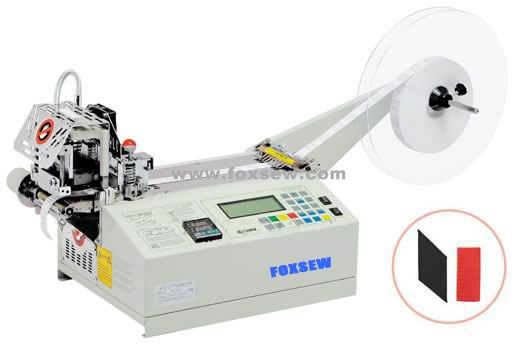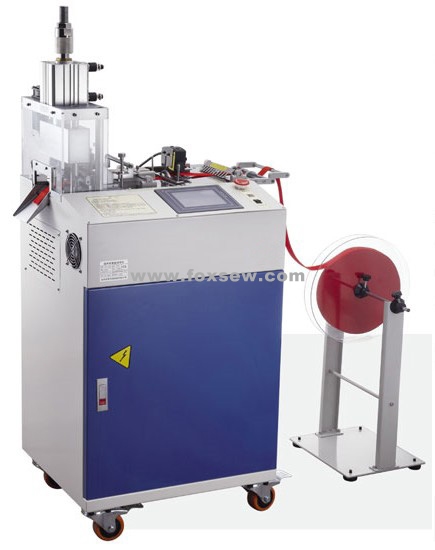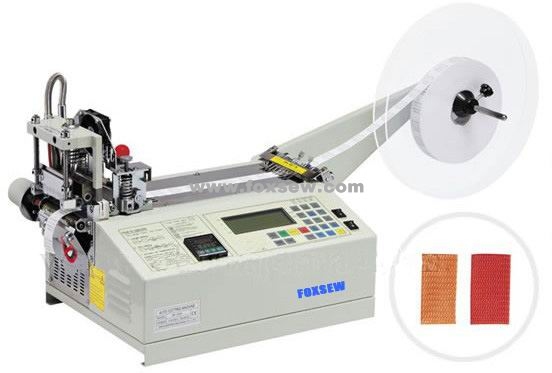FOXSEW Ribbon Cutting Machines
included all kinds of Ribbon Cutting Machines, Multi Function Ultrasonic Ribbon Cutting Machine, Automatic Hot Knife Angle Ribbon Cutting Machine, Auto Hot Knife Ribbon
Cutting Machine, Automatic Cold Knife Ribbon Cutting Machine, Multi Function Ribbon
Cutting Machine with Hole Puncher and Sensor, Computerized Heavy Duty Ribbon Cutting Machine, Nylon Ribbon Cutting Machine, Polyester Ribbon Cutting Machine, Woven Ribbon Cutting Machine, Satin Ribbon Cutting Machine, Grosgrain Ribbon Cutting Machine, etc...
FX-120HX
is Automatic Hot Knife Angle Ribbon Cutting Machine, it can cut bevel and straight ribbon with sealed.
FX-150
Series are high level Ribbon Cutting Machines, can be equiped with
hole punching device, and the cutting angle can be customized.
After
10 years experience, FOXSEW is becoming the leading company in the Ribbon Cutting Machine industry, FOXSEW ribbon cutting machines are
sold
well all over the world, won good reputation from the customers and
market.
So, the price and quality is top in the world, and you can find all kinds of Ribbon Cutting Machines here.
Ribbon Cutting Machine Polyester Ribbon Cutting Machine, Ribbon Cutting Machine, Angle Ribbon Cutting Machine, Satin Ribbon Cutting Machine, Grosgrain Ribbon Cutting Machine, Hot Knife Ribbon Cutting Machine, Ultrasonic Ribbon Cutting Machine TAIZHOU FOXSEW SEWING MACHINE CO.,LTD. , https://www.chinafoxsew.com
A. Volvo does not build a factory in China to sell only cars
At present, the demand for China's heavy-duty truck market has gradually changed from a "practical" feature to a comfortable, quality-based, and brand-like model. With the rapid development of the expressway and logistics industry, the demand for heavy trucks that are lightweight, safe, reliable, stable in performance, comfortable to drive, and high-speed and heavy-duty are increasing, while domestic heavy trucks are characterized by low prices and strong performance. , But durability, safety, comfort and performance stability are far less than berths or joint venture brands such as Volvo, Mann, Scania, Iveco (quotation picture parameters).
"Volvo" means "moving forward" in Latin. In China, there are "Volvo sounds, gold is tens of millions." For Chinese heavy truck owners, “Time is money†because the good rate of a heavy truck (money machine) is directly related to the owner's efficiency and efficiency.
At present, the Bora Volvo heavy truck has the most complete product line in the Chinese market. From the distance and load: FL (18-32 tons), FM (30-60 tons) and FH (40-100 tons); from the engine power: 250HP-500HP above; from the models Said: tractors, dump trucks, concrete mixers, pump trucks, vans are. And it is synonymous with brand, quality and price. Individuals in China, of course, cannot afford it. Unless they can find one in the second-hand car market, the price is still similar to that of a domestic new high-end heavy truck. Volvo's user base in China is mainly concentrated on large-scale logistics companies, military forces, fire fighting, and some powerful joint venture distribution companies, power telecommunications companies, etc.
At first, Volvo Trucks entered the Chinese market and Volvo vowed to "long-term concern and commitment to China's road transport industry and the world." Today, Volvo Trucks applies the business concept of “Create maximum operational value for its customers in China†to practice in China and has vividly and brilliantly explained this concept.
According to the analysis of Volvo Group's global CEO, Leif Johansen, “The volcanic rebound of the Volvo Group in the Asian market especially in China this year has a powerful effect on the recovery of the Group's global business. The first quarter figures show that the growth of Volvo’s European business is approximately At 10%, the U.S. growth is about 15%, while its growth in China is as high as 25% to 30%!"
Leif Johansen also stated: “The Chinese market has now become one of the core markets for the development of the Group. In the future, the Volvo Group will continue to increase its investment in all aspects of development. From a strategic point of view, it will continue to be developed in the future. The development of localized R&D is also intensifying; in addition, the construction of infrastructure in the Chinese market is in full swing, which undoubtedly provides a broad space for progress in the development of construction equipment.In the future, Volvo will continue to apply new technologies to meet the needs of the Chinese domestic market. At the same time, it will also really launch products for Asian customers' needs. The Volvo Group has already established a Chinese R&D center in Jinan that is backed by global R&D strengths to ensure that it can better meet the various business needs of local Chinese customers...â€
The Volvo Group will focus on continuing to adhere to the import of Volvo Trucks and Renault Trucks, and its main business in China - construction machinery will continue to strengthen. In fact, as early as ten years ago, Volvo saw the rich potential of China's commercial vehicle market, and had made market predictions. It believes that the sales volume of China's truck market will reach 1.5 million by 2010, when it will be Japan, South Korea and Southeast Asian countries. The sum of demand is expected to become the second largest heavy truck market after the United States.
B. Volvo and China National Heavy Duty Truck "Lao Yan fly"
In 2003, the global expansion of the Volvo Group finally opened up a gap in the truck sector in China, and Jinan Huawo Truck Co., Ltd., a joint venture with China National Heavy Duty Truck, was formally established. Huawo Truck was founded by a joint venture between Volvo Trucks and China National Heavy Duty Truck in 2003 and was put into production in 2004. It is the first approved heavy truck joint venture in China. The total investment is RMB 1.6 billion and the proportion of investment is 50% each. The joint-venture negotiations between the two parties took place for 9 years and the original cooperation deadline was 30 years. In 2005, domestically produced Volvo heavy trucks only achieved production and sales of more than 200 vehicles. In 2006, due to the high price of the car and too little sales, Jinan Huawo started to completely stop production. In July 2009, Sinotruk signed a long-term strategic agreement with the German MAN Group. MAN invested 560 million euros in Sinotruk to jointly develop new trucks specifically targeting emerging markets, making Volvo's withdrawal almost inevitable. In November, the Volvo Group formally announced the termination of its cooperation with Sinotruk. Withdrawing from the joint venture and withdrawing from the joint venture marks the end of this originally scheduled 30-year cooperation, and Volvo will sell its stake in Jinan Huawo Truck Co., Ltd. Rev Johnsen, president of Volvo Group, said in Beijing that Volvo will not seek to establish a second truck joint venture in China after withdrawing from Jinan Huawo.
As China's commercial vehicle market is different from the passenger vehicle market, more than 90% of commercial vehicles are self-owned brands. Because foreign brands are expensive, it is difficult for the Chinese market to accept Volvo heavy trucks whose price exceeds 600,000 yuan. In addition, China’s ultra-high-end heavy truck market is small each year and it is difficult to form a scale. Coupled with the poor operation of the joint venture company, low sales volume and the inconvenience of the shareholders' contradiction are the main reasons for the disintegration of Jinan Huawo. Although the appearance of God from the two sides tried to restart Huawo several times, but ultimately did not reach. At the same time, after the establishment of the joint venture, it did not bring significant advancement to the localization of Volvo heavy trucks. Volvo said that Sinotruck rebelled itself and abandoned the technology. After stealing technology, China National Heavy Duty Truck Group alleged that Volvo made false localization, was keen on CKD production, imposed a technical blockade, and caused high product costs, making it difficult to compete with other domestic heavy truck products. At the same time, Jinan Heavy Truck Jinan imitated Jinan Huawo model HOWO heavy truck production and put into operation, and quickly achieved success, which led to further intensification of the contradictions between shareholders, the final "marriage" rupture and disintegration, labor Yanfen fly, go their separate ways.
C, Volvo and Dongfeng Company "No Call"
Volvo had disclosed a framework agreement with Dongfeng. In January 2007, the two parties were negotiating on the cooperative production of commercial vehicle projects. There was also no agreement on the cooperation ideas. Since both parties still needed to solve the problems of capital and equity, the cooperation negotiations between the two parties were once again grounded. In particular, after Volvo withdrew from Sinovac Sinoworth project in 2009, Volvo began to look for new partners. Dongfeng company once again entered its vision, which also brought hope to the resumption of Dongfeng joint venture project. Previously, the difficulty in negotiating was revealed in the issue of equity. According to China's automobile industry policy, foreign-invested automobile manufacturers must have joint ventures with Chinese companies in the production of complete vehicles in China, and Chinese companies must not have less than 50% of their shares in joint ventures. Dongfeng's almost all good commercial vehicle assets were injected into the new company jointly established with Nissan in 2003—Dongfeng Limited. The negotiations between Dongfeng and Volvo have been considered to have been carried out by Dongfeng Commercial Vehicles Shiyan Company and Liuzhou Automobile.
Dongfeng Nissan Diesel currently holds a 50% stake in Dongfeng and Volvo, and produces Nissan Diesel (UD) and Dongfeng Nissan Diesel (DND) brand trucks with a capacity of 10,000 vehicles. At present, Dongfeng and Volvo have established a joint venture company, Dongfeng Nissan Diesel, and both parties will continue to expand Dongfeng Nissan Diesel's business in the future. In fact. Nissan Diesel previously owned a joint venture with Dongfeng, Dongfeng Nissan Diesel. After Volvo acquired Nissan Diesel, it naturally became a cooperation between Volvo and Dongfeng. But so far, no progress has been made on the progress of joint venture projects between Dongfeng Commercial Vehicles and Volvo Trucks, Volvo and Dongfeng. The Volvo commercial vehicle joint venture project in China is still a suspense. If the joint venture with Volvo succeeds, Dongfeng Heavy Trucks will continue to take a leading position in the domestic market even more. The Volvo Group's most famous is the technology of heavy trucks. Once it is aligned with it, Dongfeng’s heavy truck strength will be even stronger.
The author thinks that the concept of oriental people thinks that Volvo Trucks' joint ventures in China are often met with obstacles. Volvo should change its strategy and learn from Germany. It is not always the brand's introduction of Chinese technology, but the introduction of technology in advance, and then penetrated into the brand. However, the principle of Nordic Swedes' thinking is very different from that of the Chinese people, so it is impossible to talk about it in China.
At a media briefing held recently by Levo Johansson, Volvo's global CEO, Volvo revealed that after suspending the joint venture program with Sinotruck, Volvo has not sought a plan for a new heavy truck business partner in China for the time being. At the same time, he said that during the crisis period of the past two years, the development of the Chinese business has played a very important stabilizing role for the Volvo Group's global business. The Chinese market has become one of the core markets for the Group's development. The future Volvo Group will Continue to increase investment in the Chinese market.
At the same time, Leif Johansen said, “At present, we have no plans to find other heavy truck partners.†He said, “Volvo currently has two strong partners in Dongfeng and Nissan Diesel in China. They are already at Volvo. The development of the Chinese market has laid a very good foundation, so Volvo is currently not looking for other partners, but in the product area, Volvo is ready to increase the launch of new heavy-duty products in China, especially in fuel economy and high Volvo's advantages in energy efficiency engines."
D, Volvo remarried Eicher, India
A few years ago, it was reported that Volvo Trucks, which was repeatedly frustrated by Hua He, may establish a new joint venture company, VE Commercial Vehicles, with Eicher Automotive Co., the third-largest commercial vehicle manufacturer in India. But today (June 12th), the prestigious "GaisAutomotive" is the first to report: "The Swedish truck manufacturer Volvo is in the process of establishing a joint venture with its Indian partner Eicher to produce a plant that meets Euro IV and Euro V (quotations Picture parameters) and Euro VI trucks. The joint venture plant in Pithampur, central India, can produce 100,000 cars per year, of which nearly half will be exported to other markets outside of India. The Volvo-Eicher joint venture has announced it will In the second half of the year, production of buses will begin and heavy vehicles will be produced from the end of the year."
Divorced with China National Heavy Duty Truck and no hope of getting married with China Dongfeng Motor Company, Volvo has only been forced to remarry Eicher in India. What is certain, however, is that the current size and future development potential of India's auto market is much slower than that of China. As long as Volvo changes the Nordic way of thinking and lays down as China’s sleek opportunists, China’s large number of copycat trucks are all eager to get big money. All of them were reluctant to climb the dragon and attached the phoenix. Moreover, Volvo was still a “Mrs. Lady†and “Missing Daughter of Grandmotherâ€. There was nothing wrong with polygamy and a daughter-in-law who used to be in China.
Therefore, Volvo does not need to worry about Volvo's trademark issue at all. Once a successful joint venture with the Shanzhai version of the truck company in Laos, it will be better and more pleasing to the Volvo brand from top to bottom and from inside to outside. The prestige is more proud and dazzling. It will never appear that the issue of hanging “Volvo†or “wind wheel†in Dongfeng Motor’s talk about marriage will eventually result in a small problem of falling apart. Therefore, I personally warmly welcome Volvo to return to China to build a shop and set up a factory. In China, "remarriage" or "big-marriage" is even more exciting! Moreover, compared to India, it is definitely a hundred times stronger than the country with its vast and rich people and large market. !



Automatic Angle Ribbon Cutting Machine Hot Knife FX-120HX
Ultrasonic Ribbon Cutting Machine Multi Function FX-2200
Automatic Hot Knife Ribbon Cutting Machine FX-120H